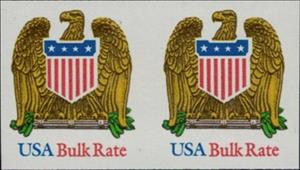Se-tenant: Eagle and Shield (United States of America 1993)
Eagle and Shield (United States of America 1993)
29 May (United States of America ) within release 1991-1994 Regular Issue goes into circulation Se-tenant Eagle and Shield face value 2*Bulk No Face Value
| Se-tenant Eagle and Shield in catalogues | |
|---|---|
| Stamp Number: | Sn: US 2603a |
Se-tenant is square format.
Imperforate pairAlso in the issue 1991-1994 Regular Issue:
- Stamp - Eagle and Shield face value Bulk Rate;
- Stamp - Eagle and Shield face value Bulk Rate;
- Se-tenant - Eagle and Shield face value 2*Bulk;
- Stamp - Eagle and Shield face value Bulk;
- Stamp - Eagle and Shield face value Bulk;
- Stamp - Eagle and Shield face value Bulk;
Se-tenant Eagle and Shield it reflects the thematic directions:
Birds (Aves), a subgroup of Reptiles, are the last living examples of Dinosaurs. They are a group of endothermic vertebrates, characterised by feathers, toothless beaked jaws, the laying of hard-shelled eggs, a high metabolic rate, a four-chambered heart, and a strong yet lightweight skeleton. Birds live worldwide and range in size from the 5 cm (2 in) bee hummingbird to the 2.75 m (9 ft) ostrich. They rank as the class of tetrapods with the most living species, at approximately ten thousand, with more than half of these being passerines, sometimes known as perching birds. Birds are the closest living relatives of crocodilians.
A coat of arms is an heraldic visual design on an escutcheon (i.e. shield), surcoat, or tabard. The coat of arms on an escutcheon forms the central element of the full heraldic achievement which in its whole consists of shield, supporters, crest, and motto. A coat of arms is traditionally unique to an individual person, family (except in the United Kingdom), state, organisation or corporation.
Eagle is the common name for the golden eagle, bald eagle, and other birds of prey in the family Accipitridae. Eagles belong to several groups of genera, some of which are closely related. True eagles comprise the genus Aquila. Most of the 68 species of eagles are from Eurasia and Africa. Outside this area, just 14 species can be found—two in North America, nine in Central and South America, and three in Australia.



